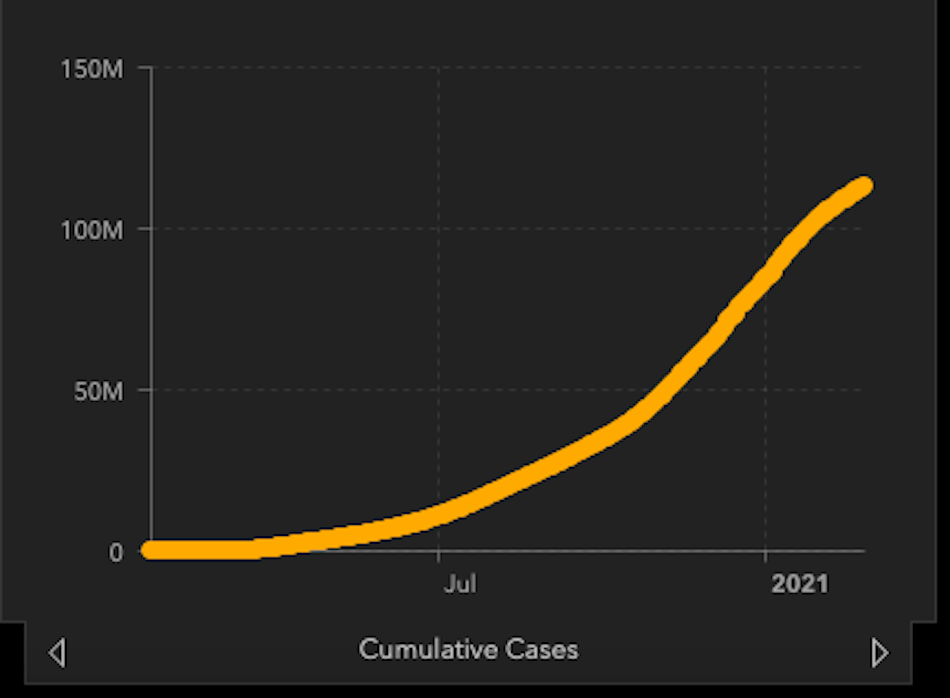[ad_1]
Live version of coronavirus map
The United States hailed progress in turning around its troubled Covid-19 vaccine rollout, as the European Union said it was on track to meet jab targets and Asia’s inoculation drive gained pace on Friday.
Brazil hit 250,000 fatalities – the second-highest national death toll after the United States – while the worldwide vaccine campaign received the endorsement of Queen Elizabeth II, 94, who urged people not to be wary of the shot.
President Joe Biden declared the US rollout is now “weeks ahead of schedule†as he celebrated 50 million doses administered since he took office on January 20, but he warned Americans to keep masking up.
“We’re moving in the right direction despite the mess we inherited,†Biden said, referring to the program under his predecessor Donald Trump.
The United States is the world’s hardest-hit country, with coronavirus deaths crossing the 500,000 mark earlier this week.
Rollouts in Asia also gathered momentum as Hong Kong and South Korea began their mass vaccination programs on Friday.Â
Both places were among the first to experience outbreaks after the coronavirus spread from central China early last year, but have kept infections comparatively low.
South Korea plans to inoculate 70% of its population within seven months, while Hong Kong aims to vaccinate all adults by the end of the year.
And after months of supply problems and friction, the EU said Thursday it was confident in meeting its goal of vaccinating 70% of adults by the end of the summer.
‘Think about other people’
The coronavirus has killed more than 2.5 million people worldwide, with nearly 113 million known infections, and vaccine rollouts have been patchy.
Most of the 217 million doses administered globally have gone to wealthier countries, and among those struggling with shortages is Brazil.
The South American nation crossed a quarter-million death toll on Thursday as it battles a devastating second wave of infections.
The coronavirus has hit especially hard in Brazil’s impoverished “favelas,†among indigenous communities and in the Amazon rainforest city of Manaus, where there have been haunting scenes of mass graves and patients suffocating to death with no oxygen.
There was also worrying news Friday out of impoverished Papua New Guinea, which reported its largest daily jump in cases since the pandemic began, with infections spreading to remote regions with poor health infrastructure.
But efforts to ensure wider availability of vaccines were given a boost when the US Food and Drug Administration said frozen vials of the Pfizer-BioNTech vaccine may be stored at temperatures commonly found in pharmaceutical freezers – instead of specialized ultracold ones – for up to two weeks.
And Britain’s Queen Elizabeth II helped counter vaccine hesitancy – another worry for public health experts and planners – by saying in a video message that her shot “didn’t hurt at all,†and encouraged those reluctant about inoculation to “think about other people.â€
‘We need time to heal’
The pandemic has unleashed devastation on multiple fronts, and nations are grappling with not only the disease, but the human and economic impact of lockdowns, border closures and isolation.
North Korea has imposed one of the world’s tightest pandemic border closures, banning international rail and air travel, and eight Russian diplomats and family members had to undertake a difficult journey to get home.
The final stretch of the voyage was on a rail trolley – laden with women, children and suitcases – pushed by diplomat Vladislav Sorokin across a border railway bridge.
The psychological impact of isolation during coronavirus restrictions also is a developing concern around the world, and in Japan, some companies are marketing cute and clever robots to help ease loneliness.
At one cafe near Tokyo, customers can interact with “Lovots†– an android the size of a small toddler which reacts to touch with squeaks of joy.
Yoshiko Nakagawa, 64, called out to one of the robots at the cafe fondly by name, as if to a grandson.
“We need time to heal ourselves after this bleak period,†she said.
“If I had one of these babies at home, the heartwarming feeling would probably do the trick.â€
– AFP
[ad_2]
Source link










